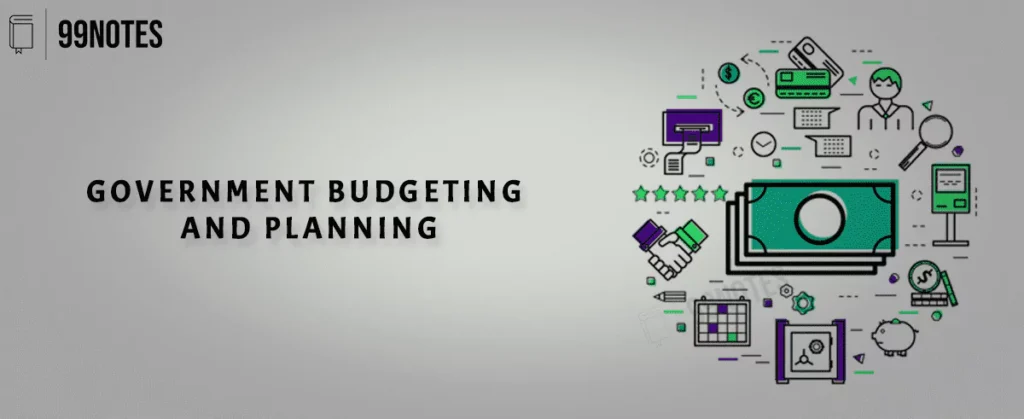
Government Budgeting And Planning Free UPSC Notes Download
More About Government Budgeting and Planning
- Government budgeting and planning refers to the process by which governments allocate their financial resources and set goals for the future.
This process involves the development of a budget, which outlines the government’s expected revenues and expenditures, and a plan, which outlines the government’s priorities and objectives.
- The budgeting and planning process begins with the development of a budget proposal, which is typically prepared by the finance ministry or a similar government agency.
- The budget proposal outlines the government’s expected revenues and expenditures for the coming year, and is based on a number of factors such as economic forecasts, policy priorities, and the government’s overall financial situation.
- Once the budget proposal has been developed, it must be reviewed and approved by the legislature or parliament.
- This process typically involves a thorough examination of the budget proposal by a committee of lawmakers, who may make recommendations for changes or improvements.
- The final budget is then voted on by the legislature or parliament and, if approved, becomes law.
In addition to the budget, governments also develop long-term plans that outline their priorities and objectives for the future.
- These plans may cover a wide range of areas, such as economic development, social welfare, defense, and infrastructure.
- The planning process typically involves consultation with stakeholders, such as government agencies, business groups, and civil society organizations, in order to ensure that the government’s goals and priorities are aligned with the needs and concerns of the community.
Effective government budgeting and planning is essential for the effective and efficient use of public resources. It helps to ensure that the government is able to fund the programs and services that are important to the community, and that it is able to achieve its goals and objectives in a cost-effective manner.
- At the same time, the budgeting and planning process can be complex and politically sensitive, as it involves difficult decisions about the allocation of scarce resources and the trade-offs that must be made in order to achieve the government’s priorities.
Overall, government budgeting and planning is a critical aspect of the governance of any country, and is essential for the effective and efficient use of public resources. It is a process that requires careful consideration, consultation, and oversight in order to ensure that the government’s goals and priorities are aligned with the needs and concerns of the community.
Purposes of Government Budget
- Reallocation of Resources – It assists in the distribution of resources in consideration of the country’s social and economic situations.
- Reducing Income and Wealth Inequality – The government attempts to achieve economic equality by levying taxes on the wealthy and allocating the funds to the welfare of the poor.
- Contributing to Economic Growth – The pace of investment and savings determines a nation’s economic growth. Therefore, the budget plan focuses on providing sufficient resources for public sector investment and increasing the total rate of investments and savings.
- Stabilizing the Economy – The budget focuses on preventing business swings in order to achieve the objective of economic stability. Deficit budget policies (during deflation) and surplus budget policies (during inflation) help to maintain price stability in the economy.
- Managing Public Enterprises – Numerous public sector industries are created for the public’s wellbeing. The budget is expected to include various measures for operating and assisting such businesses.
It intends to eliminate regional disparities by encouraging the development of manufacturing units in undeveloped regions.
Fiscal Policy
Fiscal policy is the employment of government taxation and spending to impact the economy.
The fiscal policy of a nation manages the flow of tax income and governmental expenditures in order to guide the economy. The government runs a surplus if it gets more tax and non-tax revenue than it spends, and a deficit if it spends more than the tax and non-tax collections. To cover increased expenses, the government must borrow either locally or internationally. The government may also opt to utilise its foreign exchange reserves or issue new currency.
- In India, fiscal policy is the guiding force that helps the government determine how much money it should spend to promote economic activity and how much income it must generate from the system in order to keep the wheels of the economy turning smoothly.
- The Government of India’s fiscal strategy has as one of its primary objectives achieving rapid economic growth. In addition to monetary policy, fiscal policy is vital to the management of a nation’s economy.
Principal aims of India’s Fiscal Policy
- Economic expansion: It aids in maintaining the growth rate of the economy so that particular economic objectives may be attained.
- Price stability manages the price level in a country so that prices can be managed when inflation is excessive.
- As a means to recover from low economic activity, it seeks to reach full employment or near full employment.
Importance of India’s Fiscal Policy
- In a country like India, fiscal policy plays a crucial role in increasing the rate of public and private capital formation.
- The fiscal policy mobilises a substantial quantity of money to finance its multiple objectives through taxes.
- In addition, fiscal policy provides stimuli to increase the savings rate.
- The fiscal policy provides the private sector with sufficient incentives to develop its operations.
- The objective of fiscal policy is to minimise the disparity in the distribution of income and wealth.
Indian Deficit Financing
Deficit financing is described as “borrowings from the Reserve Bank of India in exchange for the issuance of Treasury Bills and reducing accumulated cash holdings.”
When borrowing from the Reserve Bank of India, the government simply transfers its securities to the Bank. On the basis of these securities, the bank prints and distributes more cash on behalf of the government. This constitutes the creation of currency.
Justification for Deficit Financing: Sometimes the government is unable to raise sufficient funds. In this circumstance, deficit financing is essential to satisfy fiscal deficit objectives. If deficit finance is not utilised, the government’s growth objectives will be compromised.
The FRBM Act
- The Fiscal Responsibility and Budget Management Act, 2003 (FRBMA) is a law passed by the Indian Parliament to institutionalise financial discipline, lower India’s fiscal deficit, enhance macroeconomic management, and the overall management of public finances by moving toward a balanced budget.
Objectives
- Reduction of fiscal deficit and revenue deficit; Achieving intergenerational equity in fiscal management by reducing the debt burden of future generations; Achieving long-term macroeconomic stability; Better coordination of fiscal and monetary policy; Transparency of the government’s fiscal operations.
Principal Provisions of the 2003 FRBM Act
- The FRBM regulation established a fiscal deficit reduction objective of 3% of GDP by 2008-09. The federal government will achieve this with an annual reduction target of 0.3% of GDP every year.
- The revenue shortfall must be lowered by 0.5% of GDP year and eliminated entirely by 2008-2009.
Reduction of Government Debt
The government must take the necessary steps to minimise the fiscal deficit and revenue deficit in order to erase the revenue deficit by 2008-09, and then generate a substantial revenue surplus.
It required yearly reduction objectives for the fiscal deficit, revenue shortfall, contingent liabilities, and total liabilities.
The government will no longer borrow from the RBI, with the exception of temporary loans.
After 2006, the RBI was not supposed to subscribe to principal offerings of central government securities.
The revenue deficit and fiscal deficit may only exceed the objectives stated in the rules for reasons of national security, natural disaster, or other exceptional reasons designated by the Central government.
Changes to the FRBM Act: In 2012, the Fiscal Responsibility and Budget Management Act of 2003 was amended to require the Central Government to submit to the Houses of Parliament the Macro-Economic Framework Statement, Medium-Term Fiscal Policy Statement, and Fiscal Policy Strategy Statement, in addition to the Annual Financial Statement and Requests for Grants.
The NK Singh committee, which was established in 2016 to examine the FRBM Act, said that the government should aim for a fiscal deficit of 3% of GDP in the years leading up to March 31, 2020, and then reduce it to 2.8% in 2020-21 and 2.5% by 2023.
Overall, government budgeting and planning is a critical aspect of the governance of any country, and is essential for the effective and efficient use of public resources. It is a process that requires careful consideration, consultation, and oversight in order to ensure that the government’s goals and priorities are aligned with the needs and concerns of the community.

